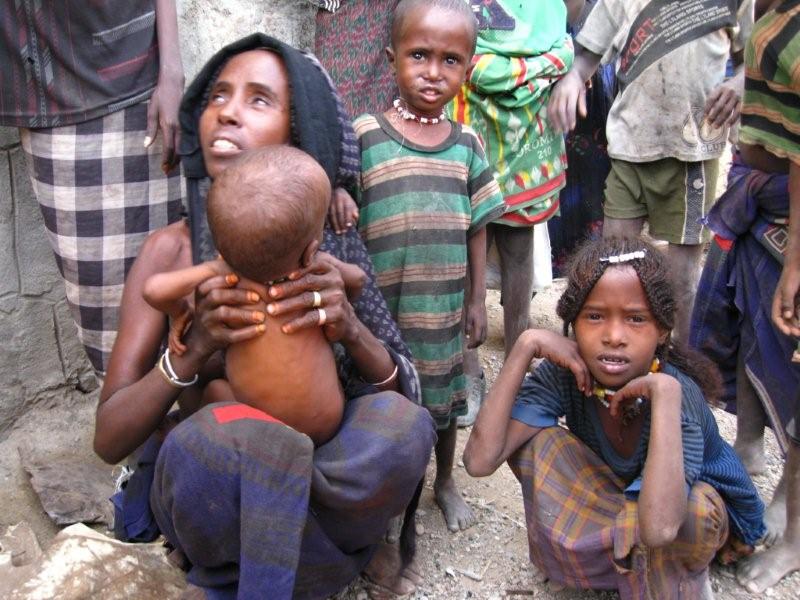It spent more than US$50 million to dramatically increase the number of sites providing ready-to-eat blended food used to treat acutely malnourished children, and plans to spend a similar amount this year.
UNICEF estimates that it will need 600 to 1,000 tonnes of ready-to-use therapeutic food (RUTF) a month in Ethiopia, but availability will "remain a major issue" in 2009.
"The global demand for ready-to-use therapeutic food outstripped supply last year, which gives the sense of the scale of the need," explained Louis-Georges Arsenault, director of UNICEF's emergency programmes. The agency has had to intensify its nutritional interventions in 17 of the 27 countries identified as worst affected by the global food price crisis.
This year UNICEF is asking for just over US$1 billion in its new global appeal, of which health and nutrition needs will take the biggest portion – 38 percent - to care for women and children in only 36 countries, "and UNICEF runs operations in 150 countries," Arsenault noted.
Even before the price spike in 2008, "many families were struggling to survive, although prices fell by 75 percent between 1974 and 2005", said the UNICEF appeal document. "Between May 2007 and May 2008, the food price index rose by 50 percent, making it impossible for some families to afford basic foods for their children."
Since 2008, Ethiopia, Zimbabwe and Somalia have doubled UNICEF's financial needs for protracted emergencies in Eastern and Southern Africa in 2009. Zimbabwe, with its collapsing social services and a cholera epidemic that has claimed almost 3,000 lives, has escalated UNICEF's requirements in that country fivefold.
Climate change
Scaling up nutritional interventions has become critical as more climate change studies forecast alarming projections, the appeal document said. "There is convincing evidence that many of children's main killers - malaria, diarrhoea and undernutrition - are highly sensitive to climatic conditions."
The UNICEF appeal cited recent studies which found that some 50 million people worldwide could be at increased risk of hunger by 2010 as a result of climate change, while other studies indicated that in the next decade children and women would represent 65 percent of all those affected by climate-related disasters, of which 175 million would be children.
Over 50 percent of the emergencies UNICEF responded to between 2005 and 2007 were caused by disasters, while conflict-related interventions accounted for 30 percent and health-related emergencies for 19 percent.
Between 2005 and 2007, UNICEF responded to some 276 emergencies in 92 countries every year. On average, only 25 percent were ongoing or protracted emergencies, while 75 percent were new emergencies, including disasters, socio-political conflict, epidemics and systematic human rights violations.
Forgotten emergencies
Arsenault drew attention to forgotten emergencies, such as in the West African republic of Chad and the Central African Republic (CAR). "They seem to have slipped off everyone's radar, and fund raising can be difficult at times."
Armed conflict and increased banditry since 2005 have displaced great numbers of people both inside and outside CAR - around 108,000 Central African refugees now live in neighbouring countries, mainly Cameroon and Chad, affecting the humanitarian situation in the region.
Since the conflict only one-third of CAR's children go to school. UNICEF has been involved in providing nutritional interventions and efforts to bring 150,000 children back to school.
Chad has been overwhelmed by a massive influx of hundreds of thousands of refugees from Darfur and CAR. UNICEF has asked for more than $34 million for its interventions in Chad in 2009 to help meet the needs of approximately 750,000 people, including 360,000 children living in eastern and southern Chad.
The money will be used to assist 310,000 refugees, over 180,000 internally displaced persons, and about 250,000 of the host population, as well as to tackle Chad's national acute malnutrition rate of 15 percent, which includes some regions where levels reach 20 percent.
jk/he/oa
This article was produced by IRIN News while it was part of the United Nations Office for the Coordination of Humanitarian Affairs. Please send queries on copyright or liability to the UN. For more information: https://shop.un.org/rights-permissions





